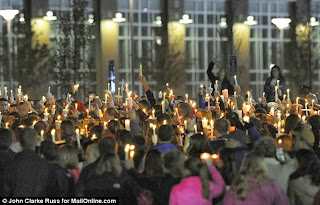And, I have been with families as they buried their warriors.
How many time have we hear coaches, players and analysts talk about football players’ “warrior mentality?” Sure, they're tough guys on the field, but they are also pampered and fawned over off the field. These athletes live in the lap of luxury, while our real warriors – our military – live in small on-base houses with sometimes barely enough money to adequately care for their families. I know soldiers who have deployed three, four, five times, whose families are on WIC because their salaries aren’t enough to sufficiently feed their family. Yet, the football players are the heroes.
Simply, one cannot compare the "warrior mentality" of a football player to a soldier because there is no comparison.
Our soldiers willingly put their lives on the line to protect our ideals and our freedom. Football players put their bodies on the line for a game. Both are mentally and physically grueling; but one does it for honor and duty; the other does it for fun and money.
Basic pay for a soldier averages somewhere around $40,000 a year. Basic pay for an Army private is just under $18,000, while a general (of which there are very few) makes into the low six figures. In the NFL, league minimum for a rookie is $405,000 a year, while the minimum for a player with 10 years’ experience is right around $1 million. That is the minimum – the average salary of an NFL quarterback is $3.4 million, the average for a wide receiver and linebacker is $1.8 million, and kickers and punters average $1.6 million – KICKERS AND PUNTERS!
Now, go up to a soldier, who has been away from his family for five of the last ten years, and seen his buddies killed and maimed, that the millionaire is a warrior.
I know soldiers’ wives who gave birth to their children alone, and had to go through those first sleepless months by themselves; fathers and mothers who had to leave their babies, and come home to children who don’t even remember them; I have seen the pain on the faces of families whose warriors are never coming home.
I have watched planes full of soldiers take off to Iraq and Afghanistan, knowing that not everyone on that flight will come home. I have watched the families of deployed soldiers struggle to make it through everyday life while the most important person in their lives is living in a dangerous place, where people want them dead. I have also been lucky enough to witness the joy of families reunited, of fathers seeing their baby – who could be nine months old – for the first time.
These men and women are warriors. They put their duty and their country before all else. They put their lives in danger so that we don't have to. They are willing to die to protect our freedom.
Football players are talented, physically-gifted freaks who are paid incredibly well because they are part of a product that produces billions of dollars in revenue each year. But they are not warriors.







